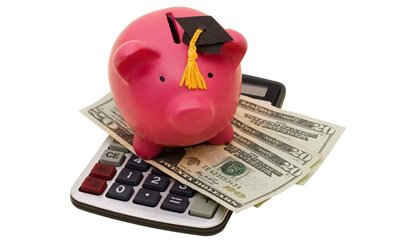Repayment
After you have left school, contact your student loan servicer to learn about your repayment options. It's important to find out the monthly amount of your repayment and when your first payment is due. You must repay your loan according the terms of the promissory note that you signed when you applied for the loan.
Choose the Federal Student Loan Repayment Options.
- Be aware that private loans may not have any or all of the same repayment options as federal loans.
- Also, in order to maintain some repayment options, annual recertification of personal financial information may be required.

Loan Consolidation
Loan consolidation is an option if you have multiple federal loans. After you leave school, you may consider combining all of your loans into a single loan with one loan servicer. This option can make it easier for you to organize and track payments since you are only making one monthly payment to one loan servicer, rather than multiple monthly payments to multiple servicers.
It is extremely important that you make your loan payments on time because missed payments can send your loan into default. Also, repeated late payments may result in increased costs and interest due.
Deferment and Forbearance
If you are finding it difficult to make your payments on time, you should consider a deferment or forbearance.
- A deferment allows you to postpone your payment if you meet a certain criteria.
- Forbearance is when the lender allows you to discontinue your payments for a temporary period of time.
The lender is not obligated to grant you forbearance. It is important to note that interest may continue to accrue on your loan during a deferment or forbearance.
Cancellation, Forgiveness and Discharge
Only in a few rare circumstances can all or part of a student loan be cancelled. For instance, a loan may be cancelled if you have become permanently disabled and are unable to work.
A student loan can be forgiven under the Loan Forgiveness for Teachers program or the Public Service Loan Forgiveness Program after the borrower first makes a specified number of payments. For eligibility requirements, please contact your loan servicer.
A student loan is generally not dischargeable in bankruptcy.
Default
If you miss a payment, or “default,” the entire balance of your loan may become due, and the lender may take legal action to recover the money, such as:
- Garnishing your wages
- Seizing your tax refunds
- Attaching your bank account
- Seizing lottery/casinos winnings
If you have defaulted on your loan, contact your loan servicer immediately to find out what remedial options are available to you.
Be aware that delinquent payments and/or defaulting on a loan may be reported to creditors which can negatively affect your credit score.
Visit Student Aid webpage for more information on loan default.
Rehabilitation
You can renew eligibility for new loans and grants and eliminate the loan default by “rehabilitating” a defaulted loan. Visit the Student Loan Borrower Assistance webpage for more information about rehabilitation.

Additional Resources:
Beware of Scams!
People with student loan debt are often targeted by companies promising to erase their debt or consolidate multiple loans. Be sure to watch out for scammers looking to make a quick buck. Some con artists may try to convince those with student loans that a new government program or policy has been set up to help their situation.
Know that student loans are only forgiven under specific circumstances, which are not necessarily easy to achieve. Companies that claim they can consolidate your student loans may simply want a fee to enroll you in a free government program. Or, they may take your student loans to a private lender at a potentially higher interest rate.
Look for some of the red flags of a potential student loan repayment scam:
- Requests for upfront fees. Scammers want their fees upfront so they can make their money without providing any meaningful benefits. Legitimate lenders will receive their fee as a percentage once they have provided their services.
- Know where to find legitimate resources. If you are having financial difficulties and may not be able to make your student loan payments, contact your existing lender directly. For repayment options involving federal student loans, visit https://studentaid.ed.gov/sa/repay-loans.
- Avoid giving power of attorney to companies, which gives them the ability to make changes to the loan on your behalf. A scammer could use the power of attorney to give himself control over your student loans, which may not result in any benefits or overall cost savings to you.
And, as always, if it sounds too good to be true, it most likely is.
**PLEASE NOTE: Many of the websites and links provided ONLY pertain to federal, government loans and information may vary as to private loans.**